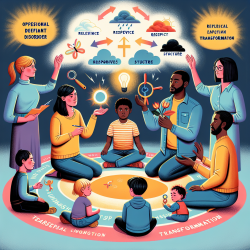In the realm of child mental health, practitioners are constantly seeking effective interventions to address disruptive behavior disorders such as Oppositional Defiant Disorder (ODD). The 4Rs and 2Ss Multiple Family Group (MFG) intervention stands out as a promising evidence-based approach designed to support families and improve child outcomes. This blog delves into the insights from a study protocol for a randomized controlled trial on this intervention, offering guidance on how practitioners can enhance their skills and encourage further research.
Understanding the 4Rs and 2Ss Intervention
The 4Rs and 2Ss MFG intervention is a structured, manualized program that integrates systemic family therapy, group therapy techniques, and behavioral parent training. It focuses on four key areas: Rules, Responsibility, Relationships, and Respectful Communication (the 4Rs), along with Stress and Social Support (the 2Ss). This approach aims to strengthen family dynamics and equip caregivers with the skills needed to manage their children's disruptive behaviors effectively.
The Importance of Family Involvement
The intervention emphasizes the critical role of family involvement in addressing behavioral issues. By engaging multiple families in group sessions, it fosters a supportive environment where caregivers can share experiences, learn from each other, and develop effective parenting strategies. This collaborative approach not only enhances family functioning but also reduces caregiver stress and depression.
Implementing the Intervention: Challenges and Strategies
While the 4Rs and 2Ss MFG intervention has shown positive outcomes in previous studies, its implementation in community settings presents challenges. These include varying levels of leadership support, provider motivation, and high family engagement needs. To overcome these barriers, the study highlights the importance of multi-level implementation processes that adapt service delivery practices sustainably.
The Role of Clinic Implementation Teams (CITs)
A key strategy proposed in the study is the formation of Clinic Implementation Teams (CITs). These teams consist of providers, clinic directors, and supervisors who work together to adapt the intervention's content, format, and structure to fit the specific needs of their clinic settings. By fostering a culture of innovation and support within clinics, CITs enhance readiness for change and sustainment of evidence-based practices.
Sustaining Evidence-Based Practices
The study underscores the significance of sustaining evidence-based practices in real-world settings. It highlights that successful adoption relies on both internal organizational factors—such as leadership support and provider attitudes—and external contextual factors like policy mandates and reimbursement mechanisms. Practitioners are encouraged to advocate for supportive environments that facilitate the uptake of effective interventions.
Encouraging Further Research
The findings from this study protocol serve as a call to action for practitioners to engage in further research. By participating in ongoing studies or initiating new research projects, practitioners can contribute to expanding the evidence base for interventions like the 4Rs and 2Ss MFG. This collective effort is essential for refining therapeutic approaches and ensuring that effective interventions reach those most in need.
Conclusion
The 4Rs and 2Ss Multiple Family Group intervention offers a valuable framework for addressing disruptive behavior disorders in children. By understanding its components, implementing it effectively in community settings, and advocating for supportive environments, practitioners can significantly impact child outcomes. As we continue to explore innovative approaches to mental health care, let us remain committed to transforming lives through evidence-based practices.
To read the original research paper, please follow this link: Testing the 4Rs and 2Ss Multiple Family Group intervention: study protocol for a randomized controlled trial.










